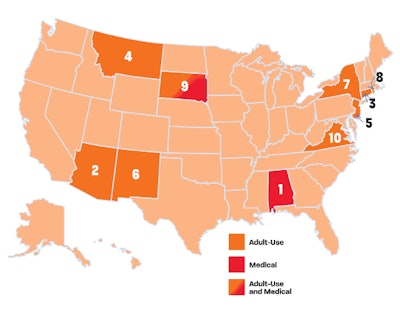
1. Alabama (medical)
Alabama unofficially became the 36th medical cannabis state when Gov. Kay Ivey signed medical-use cannabis legislation into law on May 17. Senate Bill 46 created a 14-member Medical Cannabis Commission responsible for overseeing patient registry, issuing medical cards and outlining regulations from seed to sale. S.B. 46 limits medical cannabis to forms such as pills, gelatin cubes, oils, creams and topical patches. Patients can possess up to 70 daily doses of cannabis.
- License application deadline: Application process for potential patients to be opened by Sept. 1, 2022. The Commission will present a report to the state’s Legislature by Jan. 1, 2022, providing an update toward implementation.
- Number of licenses to be awarded: Five licenses for vertically integrated operators; up to 12 cultivation licenses; no more than four processor licenses; no more than four dispensary licenses. Dispensary licensees can operate up to three sites in different counties; vertically integrated operators can have up to five dispensing sites in different counties. At least one-fifth of all licenses are to be awarded to businesses with at least 51% ownership by individuals of either African American, Native American, Asian or Hispanic ethnicity.
2. Arizona (adult-use)
Arizona voters approved Proposition 207 on Nov. 3, 2020, and sales subject to a 5.6% sales tax and 16% excise tax began Jan. 22.
- License application deadline: Closed March 9 for the 130 licensed medical operators in the state. The Arizona Department of Health Services (ADHS) will begin accepting applications for the 26 social equity licenses within six months of adopting the final rules for the Social Equity Ownership program.
- License application cost: $500 for initial or renewal registry identification card for a dispensary agent; $5,000 for initial dispensary registration certificate (if no license allocated, $1,000 is refunded); $1,000 for renewal of dispensary registration certificate; $2,500 to change the location of a dispensary or cultivation facility; $10 to amend, change or replace a registry ID card.
3. Connecticut (adult-use)
On June 22, Connecticut became the fourth state to end prohibition through the legislative process this year. The bill limits possession, purchase amounts, and dosage; restricts packaging and advertising; and allows municipalities to set appropriate zoning.
- Dispensaries open/sales begin: Commercial sales could begin as early as May 2022.
4. Montana (adult-use)
Gov. Greg Gianforte signed House Bill 701 into law May 18, 2021, modifying the voter-approved Initiative 90 to legalize adult-use cannabis. Changes include pushing back adult-use sales from Oct. 1, 2021, to Jan. 1, 2022, limiting THC content in cannabis flower to 35% and edibles to 100 milligrams per package, and capping all other concentrated products at 800 milligrams. Eligible counties or cities can vote to opt out of allowing cannabis businesses. Retail sales will be subject to a 20% excise tax, and local communities can impose an additional 3% tax.
- Cultivation licenses begin: Only existing medical cannabis providers can opt into the market for the first 18 months.
- Number of licenses to be awarded: The Department of Revenue will issue separate licenses for cultivators, manufacturers, dispensaries, transporters and testing labs. The Department will also offer 13 different cultivation or canopy licenses for different-sized facilities.
- Dispensaries open/sales begin: Jan. 1, 2022
5. New Jersey (adult-use)
Gov. Phil Murphy signed three separate bills on Feb. 22, 2021, to legalize adult-use cannabis following voters’ approval of a constitutional amendment in the November 2020 Election. The bills legalized and regulated cannabis use and possession for adults 21 and older, decriminalized cannabis and hashish possession, and clarified penalties for use and/or possession for individuals younger than 21 years old. Decriminalization measures became effective immediately. The new law caps the number of cultivators at 37 for the first two years, with existing state-licensed medical operators among those eligible to provide to the retail market.
6. New Mexico (adult-use)
Gov. Michelle Lujan Grisham signed the Cannabis Regulation Act (CRA) into law on April 12, 2021, and the legislation became effective June 29, 2021. A 12% excise tax on adult-use sales is levied until July 1, 2025, and then it increases by 1 percentage point per year up to a maximum of 18%. New Mexico will create the Cannabis Regulatory Advisory Committee no later than Sept. 1, 2021.
- License application cost: Cannabis consumptions areas: up to $2,500; producers, manufacturers, retailers, research/testing laboratories and couriers: $2,500/year, $1,000/year for each additional licensed premises; producer microbusinesses: up to $1,000/year; integrated cannabis microbusinesses: up to $2,500/year, $500/year for each additional licensed premises; vertically integrated cannabis establishments: $7,500/year, $1,000/year for each licensed premises, not to exceed $125,000; server: $35 maximum for three-year permit.
- Cultivation licenses begin: The Cannabis Control Division (CCD) will start processing license applications for all license types on Jan. 1, 2022.
- Dispensaries open/sales begin: April 1, 2022
7. New York (adult-use)
Gov. Andrew Cuomo signed the Marijuana Regulation and Taxation Act (MRTA) into law on March 31, 2021, legalizing adult-use cannabis in New York. Although adult-use cannabis sales have yet to begin in New York, adults 21 and older can still legally possess up to 3 ounces of cannabis and 24 grams of concentrated cannabis.
- Number of licenses to be awarded: The state’s Office of Cannabis Management (OCM) will actively promote social and economic equity applicants, establishing a goal of awarding 50% of licenses to social and economic equity applicants.
8. Rhode Island (adult-use)
Rhode Island’s Senate approved Senate Bill 568 to legalize adult-use cannabis on June 22, 2021, but it didn’t pass the House before the Legislature adjourned for the year. The measure would also expedite expungements for those with misdemeanor cannabis records. The legislation aims to create a five-member Cannabis Control Commission to oversee licensing to prevent monopolization by limiting business entities to one license. The bill imposes a 7% sales tax, a 10% cannabis excise tax and a 3% local sales tax.
- License application cost: 11-tier licensing system, ranging from $100 for up to 1,000 square feet of outdoor grows, to $5,000 for manufacturing and testing entities, and up to $20,000 for the largest cultivators and retailers.
- Number of licenses to be awarded: Municipalities would be eligible for at least three retail licenses, but can opt out. One-third of licenses would be reserved for individuals from communities impacted by prohibition.
9. South Dakota (adult-use and medical)
South Dakota voters approved both adult-use (Amendment A) and medical-use cannabis (Initiated Measure 26) during the November 2020 election, but adult-use legalization remains uncertain in the state due to a lawsuit.
- License application deadline: Pending the results of the lawsuit, adult-use cannabis stores will be licensed by the Department of Revenue, which has until April 1, 2022, to craft rules and regulations for the state’s adult-use program and medical cannabis program. South Dakota’s medical program was required to begin accepting patients no later than July 1, 2021.
10. Virginia (adult-use)
Virginia’s General Assembly approved a cannabis legalization amendment package in April 2021, allowing adults 21 and older to possess up to 1 ounce of cannabis and grow up to four plants per household starting July 1, 2021. The state’s Cannabis Control Authority—which began work on July 1, 2021—will complete regulations, issue business licenses and implement a social equity program, with the advisement of a Cannabis Public Health Advisory Council.
- License application deadline: Virginia’s Cannabis Control Authority will not finalize cannabis regulations or start accepting business applications before 2023.
- Dispensaries open/sales begin: Jan. 1, 2024























